AMD's Ryzen 9 6900HS Rembrandt Benchmarked: Zen3+ Power and Performance Scaling
by Dr. Ian Cutress on March 1, 2022 9:30 AM ESTEncoding
One of the interesting elements on modern processors is encoding performance. This covers two main areas: encryption/decryption for secure data transfer, and video transcoding from one video format to another.
In the encrypt/decrypt scenario, how data is transferred and by what mechanism is pertinent to on-the-fly encryption of sensitive data - a process by which more modern devices are leaning to for software security.
Video transcoding as a tool to adjust the quality, file size and resolution of a video file has boomed in recent years, such as providing the optimum video for devices before consumption, or for game streamers who are wanting to upload the output from their video camera in real-time. As we move into live 3D video, this task will only get more strenuous, and it turns out that the performance of certain algorithms is a function of the input/output of the content.
HandBrake 1.32: Link
Video transcoding (both encode and decode) is a hot topic in performance metrics as more and more content is being created. First consideration is the standard in which the video is encoded, which can be lossless or lossy, trade performance for file-size, trade quality for file-size, or all of the above can increase encoding rates to help accelerate decoding rates. Alongside Google's favorite codecs, VP9 and AV1, there are others that are prominent: H264, the older codec, is practically everywhere and is designed to be optimized for 1080p video, and HEVC (or H.265) that is aimed to provide the same quality as H264 but at a lower file-size (or better quality for the same size). HEVC is important as 4K is streamed over the air, meaning less bits need to be transferred for the same quality content. There are other codecs coming to market designed for specific use cases all the time.
Handbrake is a favored tool for transcoding, with the later versions using copious amounts of newer APIs to take advantage of co-processors, like GPUs. It is available on Windows via an interface or can be accessed through the command-line, with the latter making our testing easier, with a redirection operator for the console output.
We take the compiled version of this 16-minute YouTube video about Russian CPUs at 1080p30 h264 and convert into three different files: (1) 480p30 ‘Discord’, (2) 720p30 ‘YouTube’, and (3) 4K60 HEVC.
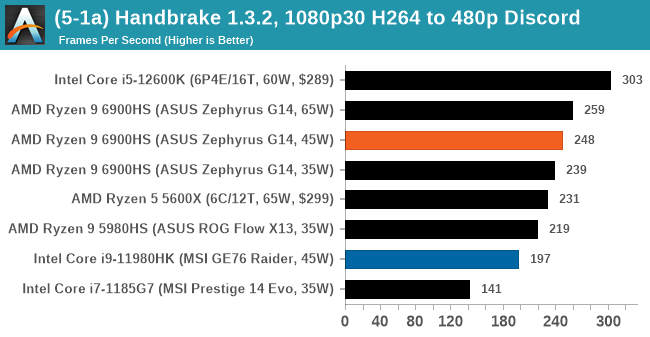
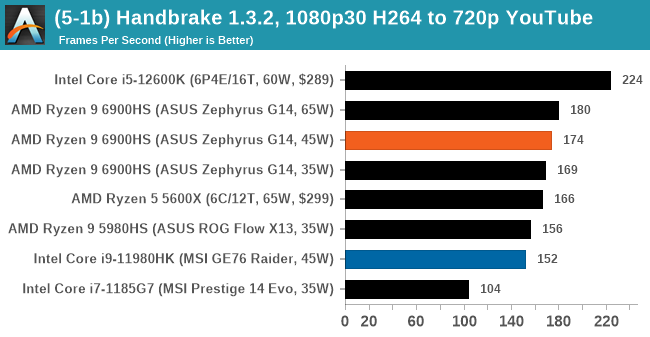
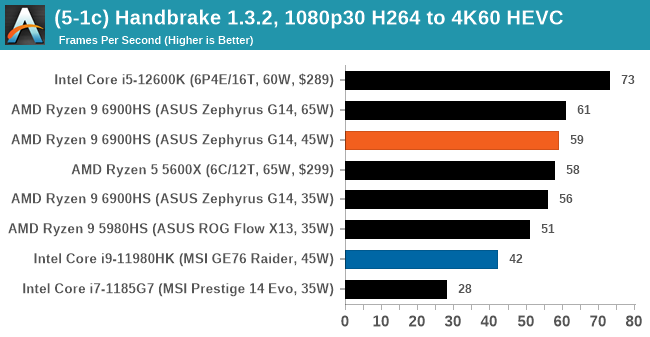
7-Zip 1900: Link
The first compression benchmark tool we use is the open-source 7-zip, which typically offers good scaling across multiple cores. 7-zip is the compression tool most cited by readers as one they would rather see benchmarks on, and the program includes a built-in benchmark tool for both compression and decompression.
The tool can either be run from inside the software or through the command line. We take the latter route as it is easier to automate, obtain results, and put through our process. The command line flags available offer an option for repeated runs, and the output provides the average automatically through the console. We direct this output into a text file and regex the required values for compression, decompression, and a combined score.
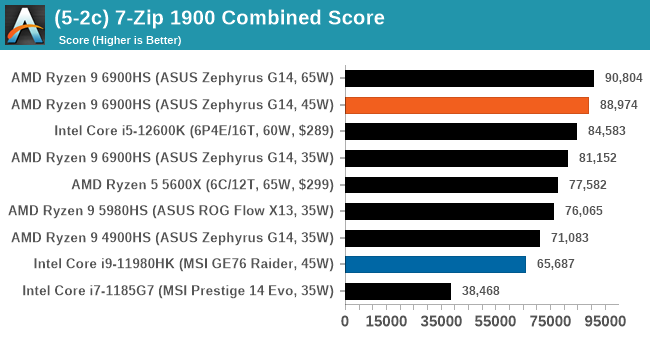
AES Encoding
Algorithms using AES coding have spread far and wide as a ubiquitous tool for encryption. Again, this is another CPU limited test, and modern CPUs have special AES pathways to accelerate their performance. We often see scaling in both frequency and cores with this benchmark. We use the latest version of TrueCrypt and run its benchmark mode over 1GB of in-DRAM data. Results shown are the GB/s average of encryption and decryption.
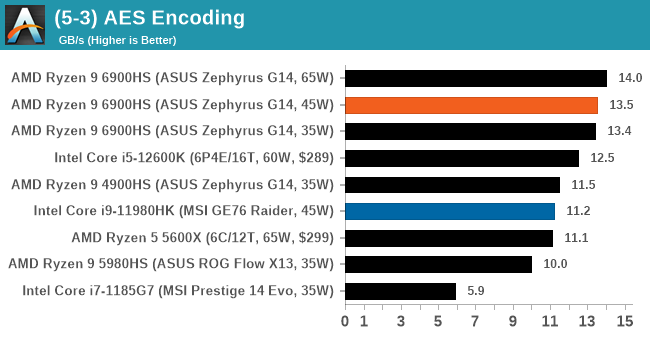
WinRAR 5.90: Link
For the 2020 test suite, we move to the latest version of WinRAR in our compression test. WinRAR in some quarters is more user friendly that 7-Zip, hence its inclusion. Rather than use a benchmark mode as we did with 7-Zip, here we take a set of files representative of a generic stack
- 33 video files , each 30 seconds, in 1.37 GB,
- 2834 smaller website files in 370 folders in 150 MB,
- 100 Beat Saber music tracks and input files, for 451 MB
This is a mixture of compressible and incompressible formats. The results shown are the time taken to encode the file. Due to DRAM caching, we run the test for 20 minutes times and take the average of the last five runs when the benchmark is in a steady state.
For automation, we use AHK’s internal timing tools from initiating the workload until the window closes signifying the end. This means the results are contained within AHK, with an average of the last 5 results being easy enough to calculate.
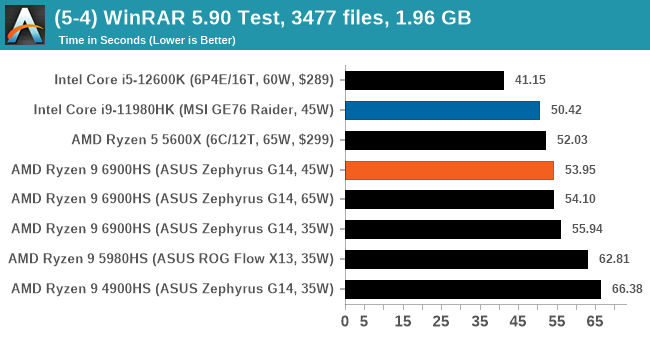










92 Comments
View All Comments
mode_13h - Friday, March 18, 2022 - link
> I haven't seen most of the anime you mentionedThe Patlabor OAVs and movies are good for an 80's/90's nostalgia hit, IMO. It's that sort of old timey mecha anime that attracted many of us to the anime multiverse, in the first place. When I watched the OAVs on blu ray, the restoration was fantastic. Very crisp HD.
> the new Dune was a big disappointment to me.
Yeah, I read the trilogy before watching it. I'm so glad I did, because I knew exactly what was going on. Otherwise, I might've been lost.
Yeah, they tried too hard to follow the narrative of the book. I think the only way to do it, and still end up with a good movie, is to focus on a particular story arc. If they'd nailed it, that would've set the stage for more to follow.
I'd imagine they shot so much footage that it could conceivably be re-edited. I know they didn't shoot beyond the movie's ending, because I saw an interview with Zendaya, where she said she was only on location for the desert scenes for a couple days.
mode_13h - Friday, March 18, 2022 - link
I mean the original Patlabor OAVs. There are about 7 of them, I think. Near movie-quality animation, for the time.BTW, some aspects of the Ghost in the Shell franchise definitely make more sense, as we move towards the future it predicted.
Oh, and Planetes is a nice series about a crew working to collect orbital debris. It aired about 2 decades ago, but I think it was based on manga that was older, still. Some aspects of it were a bit anachronistic even for the time, but other aspects about space physics and orbital living clearly received a lot of thought and attention. The story arc is a lot more interesting than it sounds, with lots of commentary about life, love, the privatization of space, corporate politics, geopolitics, personal ambition, and the ultimate path and personal costs of space exploration. If you don't mind a bit of slapstick and are willing to look past some of the more anachronistic aspects, it's worth a watch.
GeoffreyA - Saturday, March 19, 2022 - link
I haven't read the books but hope to do so before going into the coffin. Well, my view is that the excessive realism somehow harms the movie. If you go back to Lynch's 1984 version, despite the outlandish visuals, it is pretty alien, as Dune should be; and from a storytelling point of view, does that pretty well, going forward rapidly. Also, the princess's summary in the beginning got the viewer up to speed with this strange universe.The new movie took "show, don't tell" a bit too far, and the story didn't feel cohesive or unified, especially towards the end. It was tedious. The visions seemed forced and overdone. And for an epic, the cinematography was poor in my opinion. A key problem, I feel, is that it didn't bring out the true spirit of the desert. Coupled to this issue is Zimmer's music, in my view, missing the mark. It was too loud and vulgar, and seemed to view the desert from a commercialised, Hollywood lens, rather than feeling its power and reflecting that desolation. Then the CGI, I say no more.
On the plus side, two sequences were outstanding: when Paul first steps onto the desert and picks up the sand/spice; and Paul and his mother's flight through the dust storm. That was world class.
GeoffreyA - Saturday, March 19, 2022 - link
When I saw the Patlabor poster some time ago, I was intrigued. That was part two I believe. Yes, as time goes by, I prefer to look back at older anime. I think it's fair to say the industry has gone downhill these days.And thanks for that great description of Planetes. I won't mind giving one or two episodes a go and seeing what it's like. It reminds me that I've still got to watch Cowboy Bepop.
mode_13h - Sunday, March 20, 2022 - link
Planetes is one of those series that takes a while to get going. The further you go, the deeper it gets. If you really don't like the first couple episodes, maybe it's not for you. However, you do get rewarded the longer you stick with it.mode_13h - Monday, March 21, 2022 - link
> I haven't read the books but hope to do so before going into the coffin.There's a lot you can read into it about the corrupting tendencies of empires and exploitation of peoples and their natural resources. It feels like it might've tapped into the decolonization zeitgeist, or at least what I presume it should've been, as the former colonial powers of Europe unwound their foreign holdings. I could do without so much of the psychedelic stuff, but I know Heinlein also went there. So, maybe that was just another trend in 1960's sci fi.
> If you go back to Lynch's 1984 version
It's funny this came up, because I just started watching it last weekend and finished it mere hours ago. It did seem a bit overwrought. I remember how he seemed rather too fascinated with the perversions and excesses of the Harkkonen. I thought the exposition was a bit too much for the naive movie-goer, but probably a helpful reminder for those who'd read the books years earlier.
Since I came to it with low expectations, I really wasn't disappointed. Since the movie had many shots in low light, I wonder just how much I benefited from seeing a clean, HD presentation. Overall, I guess my main complaints would be that some of the acting seemed sub-par (Sting, for one, definitely should've stayed focused on the music business) and I just wouldn't have tried to cover so much plot. It felt busy and probably hard for people to follow, without having read it. I wasn't too bothered by the dated special effects, but they do kind of jump out at you. Some of the sets were quite impressive.
> The new movie took "show, don't tell" a bit too far
Probably a reaction to Lynch's version. I also wonder if his 1990 TV series, Twin Peaks, was also sort of a reaction to the criticism he got for too much exposition in Dune.
Anyway, the last I'll say about it is that I'm finding the Wikipedia page on Dune to be a good resource on the author and his influences.
GeoffreyA - Monday, March 21, 2022 - link
The visuals prevented me from watching it for a long time. It was only after I became a fan of David Lynch that I was able to see past that and appreciate what he had done. I think for a two-hour adaptation of such a vast novel, it is a commendable attempt, and I prefer it. As for the excesses, etc., well, that's Lynch as always. He always tends to bring out the darker side of things.I actually love Twin Peaks, and the recent season 3 was spectacular, if strange. But strange is this man's domain. Did too much exposition have an effect on his later work? I would say that Dune was an exception. Generally, his films are pretty obscure, nothing much being spelled out, and one often has to piece together a puzzle. He started off with that note in Eraserhead and hasn't really changed in four decades.
GeoffreyA - Monday, March 21, 2022 - link
"Sting, for one, definitely should've stayed focused on the music business"The best line!
mode_13h - Tuesday, March 22, 2022 - link
> I actually love Twin PeaksI never really watched it. My older sister watched the original TV airing. All I remember of it was the general strangeness and a recollection that even its conclusion left much unanswered.
I haven't seen much of Lynch's work, but I did enjoy Mulholland Dr. All I remember from it is that I decided it's a fool's errand to make complete sense of the plot, since there were paradoxes inserted seemingly with the intent to break any strict interpretation.
> Did too much exposition have an effect on his later work?
That's not really what I meant. I was suggesting he got too much negative feedback on all the exposition in Dune, and therefore went too far in the other direction of being too obscure.
From what I've heard, Kubrick would sometimes indulge in excessive obscurity to create a false sense of depth. The prime example being 2001: A Space Odyssey. If you actually read the book, you can supposedly see what kind of shenanigans he got up to, which I've heard he even admitted in an interview.
> He started off with that note in Eraserhead and hasn't really changed in four decades.
Ah, right. I never got round to watching that one.
GeoffreyA - Wednesday, March 23, 2022 - link
Mulholland Drive is perhaps my favourite film of all films. Again, it's the tragic note that speaks to me, and Naomi Watts, brilliant. I've racked my head over this story a great deal, and my tentative answer is that even the latter part, Diane's tale, is a dream, various pieces of evidence pointing there, particularly the blue box and the smoke. The question is, whose dream is *that*! Perhaps it's the director's dream after all.I haven't read 2001, but you're right, the film keeps things pretty bare and mysterious, and that creates the feeling of a deep, even terrible, mystery. Our age could actually learn something from that and stop filling in all the details. The human mind does a far better job at piecing together the monster in the shadows.